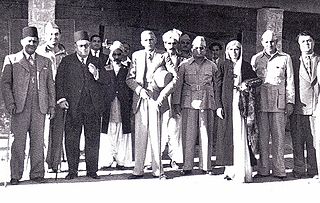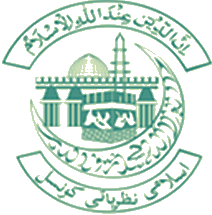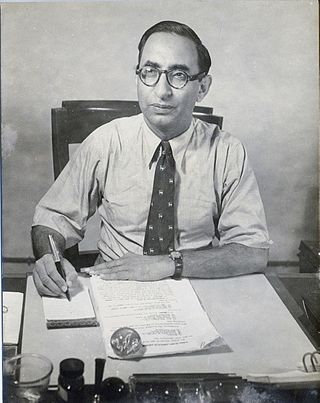
The Lahore Ahmadiyya Movement for the Propagation of Islam, is a separatist group within the Ahmadiyya movement that formed in 1914 as a result of ideological and administrative differences following the demise of Hakim Nur-ud-Din, the first Caliph after Mirza Ghulam Ahmad. Members of the Lahore Ahmadiyya movement are referred to by the majority group as ghayr mubāyi'īn and are also known colloquially as Lahori Ahmadis.

The Pakistani philosophy is the philosophical activity or the philosophical academic output both within Pakistan and abroad. It encompasses the history of philosophy in the state of Pakistan, and its relations with nature, science, logic, culture, religion, and politics since its establishment on August 1947.
The judiciary of Afghanistan currently consists of the Supreme Court, appeals courts, civil courts and city courts. All justices of the appeals, civil and city courts are presided over by Chief Justice of the Supreme Court.

Mohammad Ajmal Khan, better known as Hakim Ajmal Khan, was a physician in Delhi, India, and one of the founders of the Jamia Millia Islamia University. He also founded another institution, Ayurvedic and Unani Tibbia College, better known as Tibbia College, situated in Karol Bagh, Delhi. He was the only muslim to chair a session of the Hindu Mahasabha. He became the university's first chancellor in 1920 and remained in office until his death in 1927.
Anjuman-i-Himayat-i-Islam or Anjuman-e-Himayat-e-Islam is an Islamic intellectual and social welfare organisation with branches both in India and Pakistan. It was founded in Lahore on 24 September 1884 in a mosque known as Masjid Bakan inside Mochi Gate, Lahore, by Khalifa Hameed-ud-Din.

Hakeem Muhammad Saeed was a Pakistani medical researcher, scholar, and philanthropist. He served as governor of Sindh Province from 19 July 1993 until 23 January 1994. Saeed was one of Pakistan's most prominent medical researchers in the field of Eastern medicine.

Hakim Syed Zillur Rahman is an Indian scholar of Unani medicine. He founded Ibn Sina Academy of Medieval Medicine and Sciences in 2000. He had earlier served as Professor and chairman, Department of Ilmul Advia at the Ajmal Khan Tibbiya College, Aligarh Muslim University, Aligarh, for over 40 years before retiring as Dean Faculty of Unani Medicine. Presently, he is serving AMU as "Honorary Treasurer". In 2006, the Government of India awarded him the Padma Shri for his contribution to Unani Medicine.

Abdul Majid Daryabadi was an Islamic scholar, philosopher, writer, critic, researcher, journalist and exegete of the Quran in Indian subcontinent in the 20th century. He was as one of the most influential Indian Muslim scholar and was much concerned with modernism and comparative religions and orientalism in India. In his early life, he became sceptical of religion and called himself a "rationalist". For almost nine years, he remained away from religion but repented and became a devout Muslim. He was actively associated with the Khilafat Movement, Royal Asiatic Society, Aligarh Muslim University, Nadwatul Ulama, Darul Musannefin Shibli Academy and several other leading Islamic and literary organisations. He was disciple of Ashraf Ali Thanwi and Hussain Ahmed Madani.

Council of Islamic Ideology (CII; is a constitutional body of Pakistan, responsible for giving legal advice on Islamic issues to the government and the Parliament.

Hakeem Noor-ud-Din was a close companion of Mirza Ghulam Ahmad, the founder of the Ahmadiyya Movement, and was chosen as his first successor on 27 May 1908, a day after his death, becoming the first caliph and leader of the worldwide Ahmadiyya Muslim Community.
Nabi Bakhsh Khan Baloch was a research scholar and writer. He was termed as a 'moving library' on the province of Sindh, Pakistan.
Muhammad Hanif Ramay was an internationally renowned intellectual, painter, journalist and former Governor and Chief Minister of Punjab, and he was among the founding fathers of the Pakistan Peoples Party (PPP). He was also speaker of Punjab Assembly from October 1993 to November 1996.
Abdul Hakim Sialkoti (1560–1657) was a Muslim scholar. He was born in Sialkot during the era of Mughal Emperor Akbar. He was the son of Sheikh Shams-ud-Din. He was a scholar of Qur'an and a leading philosopher of Islam in his time. He was also known as "Fazil Sialkoti" and "Fazil Lahori". He wrote many books on logic and philosophy. His books are taught at international level Islamic universities. The Mughal emperor Shah Jahan had him weighed in gold once and in silver twice. He died on 24th Safar. His tomb is in Sialkot on the back of Abdul Hakim Park close to a Power House. He is also well known for introducing the Persian philosopher Mulla Sadra in India. He gave the title of Mujaddid Alif Thani to one of the prominent scholars of Islam, Ahmad Sihindi.
Hakim Ahmad Shuja MBE, was a famous Urdu and Persian poet, playwright, writer, film writer and lyricist, scholar and mystic, from former British India, later Pakistan.
Molana Syed Abdul Khaliq Pirzada Al-Azhari, born in 1950 in Kabirwala Shareef, Multan Shareef, Punjab Province, Pakistan, is a professor and member of the Senate of the Islamic Republic of Pakistan. He is a member of Muttahida Quami Movement (MQM). Dr. Pirzada comes from a Religious and political family. Syed Abdul Khaliq Pirzada is the son of famous religious Personality of Subcontinent "Hazrat Syed Mohammad Saeed Ahmed Pirzada" known as, a prominent Majzoob and Ex-Gaddi Nasheen of Dargah Kabirwala Shareef Pakistan.

Sheikh Muhammad Ikram better known as S. M. Ikram, was a Pakistani historian, biographer, and littérateur. He was member of the Indian Civil Service. In 1947, when Pakistan emerged from British India, Ikram opted for Pakistan and served in the Civil Service of Pakistan. On July 1, 1966, he was appointed as director, Institute of Islamic Culture, Lahore, a position he occupied until his death in 1973, at the age of sixty-four.

ʿAbd al-Ḥāmid al-Qādirī al-Badāyūnī was a traditional Islamic scholar, Sufi master, poet, and leader from Pakistan. He was the founder of the Islamic college Jamia-Talimat-e-Islamiya located in Karachi.
Syed Abdul Latif was an Indian writer of English literature. He was the president of Institute of Indo-.Middle East Cultural Studies and Academy of Islamic Studies, Hyderabad and was the author of a number of books on Islamic culture and Urdu literature, among other topics. His works included The Mind Al-Qurʼan Builds, Basic Concepts of the Quran, The Opening Chapter of the Quran, and An Outline of the Cultural History of India. The Government of India awarded him Padma Bhushan, the third highest Indian civilian award, in 1970. A trust in his honor, Dr. Syed Abdul Latif's Trust for Quranic and other Cultural Studies, has published several books on Islamic culture.
Khalifa Abdul Hakeem was a Pakistani philosopher, poet, critic, researcher, philologist, translator, and former professor of philosophy at Osmania University. He was the former director of Islamic Culture Institute, Lahore.
Muhammad Hanif Nadvi was an Islamic scholar, theologian, and commentator of the Qur'an from Pakistan.









